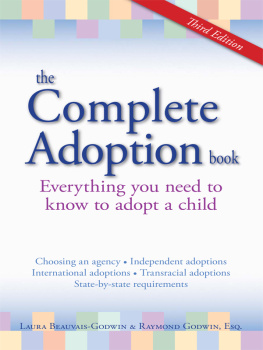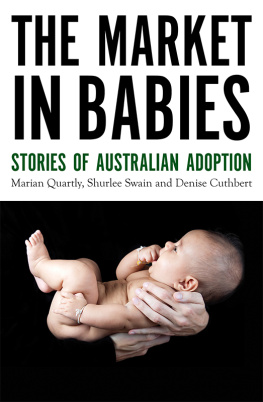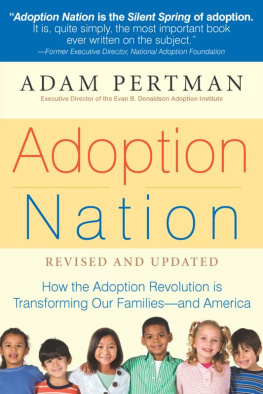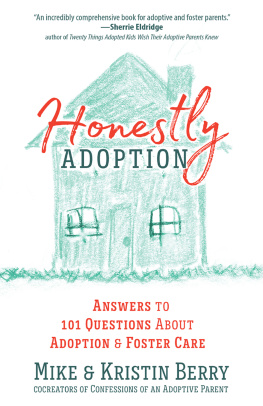The End of International Adoption?
Families in Focus
Series Editors
Naomi R. Gerstel, University of Massachusetts, Amherst
Karen V. Hansen, Brandeis University
Rosanna Hertz, Wellesley College
Nazli Kibria, Boston University
Margaret K. Nelson, Middlebury College
Katie L. Acosta, Amigas y Amantes: Sexually Nonconforming Latinas Negotiate Family
Rich J. Daniel Barnes, Raising the Race: Black Career Women Redefine Marriage, Motherhood, and Community
Ann V. Bell, Misconception: Social Class and Infertility in America
Amy Brainer, Queer Kinship and Family Change in Taiwan
Mignon Duffy, Amy Armenia, and Clare L. Stacey, eds., Caring on the Clock: The Complexities and Contradictions of Paid Care Work
Estye Fenton, The End of International Adoption? An Unraveling Reproductive Market and the Politics of Healthy Babies
Anita Ilta Garey and Karen V. Hansen, eds., At the Heart of Work and Family: Engaging the Ideas of Arlie Hochschild
Heather Jacobson, Labor of Love: Gestational Surrogacy and the Work of Making Babies
Katrina Kimport, Queering Marriage: Challenging Family Formation in the United States
Mary Ann Mason, Nicholas H. Wolfinger, and Marc Goulden, Do Babies Matter? Gender and Family in the Ivory Tower
Jamie L. Mullaney and Janet Hinson Shope, Paid to Party: Working Time and Emotion in Direct Home Sales
Markella B. Rutherford, Adult Supervision Required: Private Freedom and Public Constraints for Parents and Children
Barbara Wells, Daughters and Granddaughters of Farmworkers: Emerging from the Long Shadow of Farm Labor
The End of International Adoption?
An Unraveling Reproductive Market and the Politics of Healthy Babies
Estye Fenton
RUTGERS UNIVERSITY PRESS
NEW BRUNSWICK, CAMDEN, AND NEWARK, NEW JERSEY, AND LONDON
Library of Congress Cataloging-in-Publication Data
Names: Fenton, Estye, author.
Title: The end of international adoption? : an unraveling reproductive market and the politics of healthy babies / Estye Fenton.
Description: New Brunswick : Rutgers University Press, [2019] | Includes bibliographical references and index.
Identifiers: LCCN 2018032221 | ISBN 9780813599687 (pbk.) | 9780813599694 (hardcover)
Subjects: LCSH: Intercountry adoptionUnited States.
Classification: LCC HV875.55 .F4625 2019 | DDC 362.734dc23
LC record available at https://lccn.loc.gov/2018032221
A British Cataloging-in-Publication record for this book is available from the British Library.
Copyright 2019 by Estye Fenton
All rights reserved
No part of this book may be reproduced or utilized in any form or by any means, electronic or mechanical, or by any information storage and retrieval system, without written permission from the publisher. Please contact Rutgers University Press, 106 Somerset Street, New Brunswick, NJ 08901. The only exception to this prohibition is fair use as defined by U.S. copyright law.
www.rutgersuniversitypress.org
Contents
It was an idyllic fall afternoon when I pulled my car up outside Catherines large historic inner-suburban home. Turning off of the main road, I slowed down as a group of boys grabbed their scooters and moved to the side of the street. I smiled and waved, wondering if one of those boys was Catherines eight-year-old son, Tucker, whom she had adopted from Kazakhstan when he was nine months old. A successful, active, stylish fifty-four-year-old, Catherine had emailed me asking to participate in this project after hearing about it through her informal but close-knit single-mothers support network. She welcomed me into her immaculate living room and pointed Tucker out to me through the front windows. Catherine had worked for many years in international development, earned a PhD, and more recently, worked at the helm of a series of large charitable organizations. We sat down to talk, and I asked her to tell me how she had made the decision to adopt from Kazakhstan. She told me about a close friend of hers who, as a single woman, had adopted two daughters from China. She was my inspiration, Catherine explained, relating how she had always wanted to be a parent, even before becoming an auntie to her friends daughters. Following the path her friend had taken, Catherine began the process of adopting from China without a sense of urgency. Soon after, though, her mother died. She told me, I was really sad that my mom never got to see my child. So I wanted to accelerate the process; I had all my paperwork done, I thought I would be going to China, I thought I would be adopting a little girl. But then China instituted a quota on single women. The year was 2001, and Catherine had found herself enmeshed in the beginnings of the worldwide political and programmatic changes that would redefine international adoption in the United States over the next fifteen years.
Of course, Catherine didnt know that at the time. She explained to me that she simply started looking into other countries and heard about the international adoption program in Kazakhstan. It seemed like a really good option, she said. They had a very good orphanage system, the children were very well taken care of; I was concerned about having a special needs child, she explained, being a single parent and working full time. Like so many of the well-resourced and highly educated mothers that I interviewed, Catherine knew the literature, popular and academic, on the negative effects of institutional care on internationally adopted childrens physical, behavioral, and emotional health outcomes (for a review, see Fisher 2015; Misca 2014). Of course, Catherine wanted the best possible outcomes for her child. Catherine also knew the circumstances of everyday life that she would face upon her returnthe expense and the scarcity of childcare, the demands of her professional life, and overall, the lack of support for mothers caregiving work, particularly for special needs children.
Seamlessly, Catherine then began to tell me about all the bumps in the road that cropped up as she joined the Kazakhstan program. Initially, Catherine received a referrala matchwith a little girl (she had always thought she would adopt a girl). Following the advice of her adoption agency and the example of her friends who had adopted internationally, Catherine showed the girls medical records to a pediatrician specializing in international adoption medicine. The pediatrician told Catherine that he suspected the girl had fetal alcohol syndrome and advised her not to accept the match. The advice placed Catherine in emotional limbo as well as in a practical bind; as she explained to me, It was a weird thing with Kazakhstan, because you were not actually supposed to get a referral before you went; you were supposed to go there and pick from the children there in the orphanage. But the agencies were matching families with children as sort of an under-the-table thing. Nonetheless, Catherine traveled to Kazakhstanonly to find out that the girl initially referred to her was no longer available for adoption.
Once in Kazakhstan, Catherine was introduced to another little girl, a six-month-old infant. Catherine spent two weeks vising the baby multiple times a day, per the adoption programs policy. Youre bonding with them on their territory, which, as Catherine explained, she thought was good for the children and she really liked. But this match was also troubled. As Catherine related to me, I spent a week with this little girl, and then I was told that she was not available for adoption. In Kazakhstan, its a Soviet system, so all the kids are supposed to be on this list that theyre available for adoption for six months, but somehow, this little girl had never been put on the list. My agency never checked the list, and then it was probably a glitch at the orphanage. It was really devastating. Catherine spoke to the orphanage director, who told her that while there were no girls available for adoption at that time, there were three young boys. The director told Catherine that she could spend two days meeting the boys, but that at the end of those two days, she would have to select one of them to bring home. Faced with the alternative of leaving Kazakhstan in the hope of receiving a new referral for a baby girl, Catherine quickly accepted. As she explained to me, she was faced not only with emotional uncertainty but with political uncertainty as well. At the time, she said, the legislature in Kazakhstan was debating whether to shut down international adoption. The country had really become wealthier, and there was more domestic adoption happening. And of course, its always the issue of whether you think you should have other people adopting kids from your country, as if its like a point of pride. By then, the year was 2003, and many nations around the world were beginning to have more vigorous public debates about the future of their international adoption programs. Ultimately, at the end of that second day, Catherine was faced with the choice of which of the three young boys to adopt. She told me that she had the most information on Tucker, who was also the youngest of the group: And so that was how I decided. I knew he had been born full term. One little boy was a foundling, so they had no information on him. That was sort of it. Catherine made her decision based on the snippets of Tuckers health history that were available to her.








